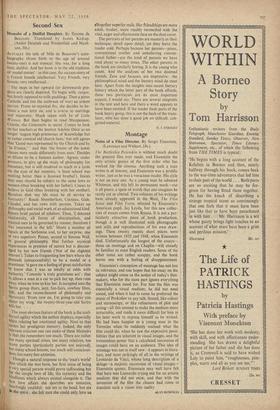Second Sex
Niclifoirs of a Dutiful Daughter. By Simone de Beauvoir. Translated by James Kirk up. (Andre Deutsch and Weidenfeld and Nicol- son, 30s.)
Ac WALLY the title of Mlle de Beauvoir's auto- biography (from birth to the age of around twenty-one) is not ironical. She was, for a long time, dutiful. And her book is in the old tradition of 'model stories' : in this case, the success-story of a French female intellectual. Very French, very female, very intellectual.
The steps in her upward (or downward) pro- gress are clearly depicted. To begin with, rangie, but firmly opposed to milk-puddings. Then a pious Catholic and (on the outbreak of war) an ardent Patriot. Prone to mystical fits, she decides to be- come a nun later on, and is averse to marriage and maternity. Much taken with Jo of Little Women. But then begins to read Maupassant, Colette, the Goncourts in secret. Comes to look on her teachers at the Institut Adeline Desir as no longer 'august high-priestesses of Knowledge but as rather comical old church hens,' but still agrees that 'Good was represented by the Church and by "la France." ' and that 'the brains of the lower classes were made differently from ours.' Decides at fifteen to be a famous author. Agrees, under pressure, to give up the study of philosophy for literature, but is still resolved to teach in a lye& (in the eyes of her mentors, 'a State school was nothing better than a licensed brothel'). Insists that men should be subject to the same laws as women (thus breaking with her father). Ceases to believe in God (thus breaking with her mother). Resolves that `my life must be of service to I humanity !' Reads Montherlant, Cocteau, Gide, ( laudel, and has rows with parents. Takes up Philosophy and social work of an educational kind. Enters brief period of nihilism. Then, 'I detested conformity, all forms of obscurantism, and wanted men to be governed by reason; therefore I Was interested in the left.' Meets a number of equals at the Sorbonne and, to her surprise, one or two superiors. Passes, second to Simone Weil, in general philosophy. Has further mystical experiences in presence of nature but is discour- aged by her new friends ('Not of the slightest interest). Takes to frequenting low bars where she pretends (unsuccessfully) to be a model or a Prostitute: `it gave me a feeling of great satisfaction
to know that I was so totally at odds with authority.' Commits `a truly gratuitous act': that is, allows a man in a car to pick her up, then runs
away when he tries to kiss her. Is accepted into the Sartre group (bars, jazz, fun-fairs, cowboy films, talk, and the reconcilement of philosophy and literature). 'From now on, I'm going to take you under my wing,' the twenty-three-year-old Sartre tells her. . . .
The most obvious feature of the book is the intel- lectual agility which the author displays, especially When relating her emotional agility. Next to that comes her prodigious memory. Indeed, the only relevant criticism one can make of these Memoirs
is that she remembers too much. There are rather too many spiritual crises, too many relatives, too many parties (particularly parties not enjoyed),
too many school lessons, too much self-conscious- hess, too many fine anxieties.
Though a natural response to the `man's world' into which she was born, her firm sense of being a very special person would prove suffocating but
for the simple love of life, the curiosity and the kindliness which always existed alongside it. The first love affairs she describes are tentative, touchingly youthful : not sex in the head, but sex the spirit : she felt sure she could only love an
altogether superior male. Her friendships are more adult, livelier, more readily reconciled with the vital, eager and affectionate face on the dust-cover.
The portraits of her parents are masterly in their technique, detail upon detail, yet they leave the reader cold. Perhaps because her parents—pious, conventional mother and unbelieving conven- tional father—are the kind of parents we have read about so many times. The other parents in the book are similarly boring. It is the young who count. And the analyses of her two doomed friends, Zaza and Jacques, are impressive : the philosophical mind and the literary mind do meet here. Apart from the insights into recent literary history which. the latter part of the book affords, these two portrayals are its most important aspects, I would say. There are several misprints in the text and here and there a word appears to have been omitted. If the reader finds parts of the book heavy going, this is not the fault of the trans- lator, who has done a good job on difficult, con- gested material.
Ii S. ENRIGHT






































 Previous page
Previous page